`Jwajang`
The late lawmaker Kim Dong-yeong and former lawmaker Choi Hyung-woo were part of the inner circle of former President Kim Young-sam. Under the military governments of the 1970s and 80s, opposition leaders such as Kim Dae-jung and Kim Young-sam had trusted representatives who managed organizations and political funds. They even went to prison on behalf of their leaders. Close confidants of the two Kims also played pivotal roles in overcoming obstacles to eventually get them elected president. Nicknamed jwajang, the representatives willingly took on difficult tasks and took care of their factions.
Kwon Roh-kap, former adviser to the main opposition Democratic Party, was the right-hand man of Kim Dae-jung and led the Donggyo-dong faction for more than 40 years. Kwon was also vice chairman of the party and nicknamed kwonbu, or a powerful figure who controls organizations and funds. One lawmaker who was especially loyal to the late former President Roh Moo-hyun is former National Assembly Speaker Kim Won-ki. President Lee Myung-baks jwajangs are his elder brother and lawmaker Lee Sang-deuk and Anti-Corruption and Civil Rights Commission Chairman Lee Jae-oh. The influence of the jwajang has waned with the decline in factional politics of the past, however.
Ruling Grand National Party lawmaker Kim Moo-sung, who is considered the jwajang to party heavyweight Park Geun-hye, has submitted a compromise proposal to move seven independent state agencies to Sejong City, such as the Supreme Court and the Constitutional Court. To this, Park said, It deserves no consideration, adding, There is no jwajang in the pro-Park group. Her comment makes sense because of her pledge never to create a faction while she headed the party when it was the opposition. Nevertheless, Kim is called the jwajang of the faction because he supported Park in the party primaries for the 2007 presidential election. Their close relationship began when Kim became the partys secretary general in 2005 while Park was chairwoman.
Park has made clear her opposition to the revised plan for Sejong City, though the party has adopted the revision as its official platform. She also opposes suggestions from pro-Park lawmakers such as review of the revision and a secret parliamentary vote. Kims suggestion of the compromise is considered an act of mutiny within the faction since it goes against Parks stance. Park apparently believes that her jwajang stands in the way of uniting her faction. What Kim will do next is accordingly drawing attention.
Editorial Writer Park Seong-won (swpark@donga.com)







